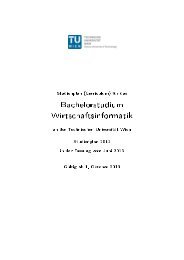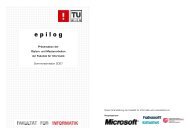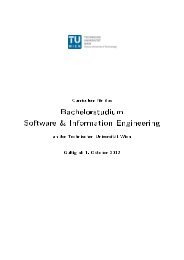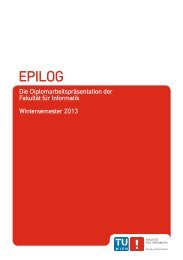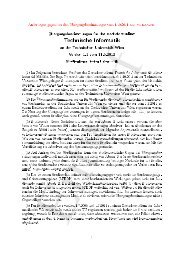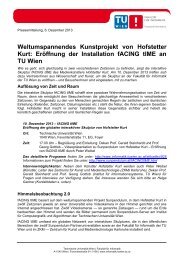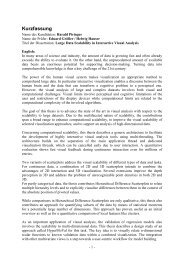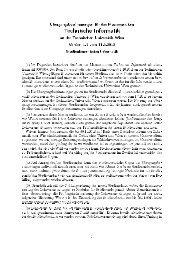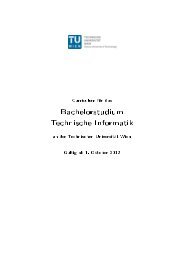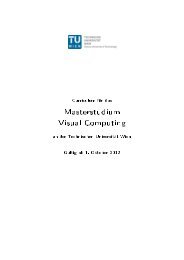Masterstudium Business Informatics - Fakultät für Informatik, TU Wien
Masterstudium Business Informatics - Fakultät für Informatik, TU Wien
Masterstudium Business Informatics - Fakultät für Informatik, TU Wien
You also want an ePaper? Increase the reach of your titles
YUMPU automatically turns print PDFs into web optimized ePapers that Google loves.
in innovation, and prove their excellent progress in their bachelor and master studies.<br />
At the end of this module they should know the basic concepts of innovation as well as<br />
the respective creativity techniques. The module contains subjects such as innovation<br />
theory and management, and focuses on the importance of innovation for businesses<br />
and society. It will also introduce creativity techniques and ways to explicitely formulate<br />
business ideas.<br />
MTD/MAS - Master Thesis (30.0 Ects) Die Diplomarbeit ist eine wissenschaftliche<br />
Arbeit, die dem Nachweis der Befähigung dient, ein wissenschaftliches Thema selbstständig<br />
inhaltlich und methodisch vertretbar zu bearbeiten. Das Prüfungsfach Diplomarbeit,<br />
bestehend aus der wissenschaftlichen Arbeit und der kommissionellen Gesamtprüfung,<br />
wird mit 30.0 ECTS-Punkten bewertet, wobei der kommissionellen Gesamtprüfung<br />
3.0 Ects zugemessen werden. Das Thema der Diplomarbeit ist von der oder dem<br />
Studierenden frei wählbar und muss im Einklang mit dem Qualikationsprol stehen.<br />
This module supports rese-<br />
MTD/SEM - Seminar for Master Students (3.0 Ects)<br />
arch work of master students during their master thesis.<br />
SBA/AEE - Advanced Economics - Evolutionary Economics (6.0 Ects) This module<br />
presents selected advanced topics in economic theory, which are particularly suited<br />
to be supported by simulation methods. Many of these topics can be summarized under<br />
the overarching concept of evolutionary economics. The respective lecture provides<br />
an introductory overview both from a historical perspective as also from a technical<br />
perspective of evolutionary economic theory. It builds on an already assumed knowledge<br />
of standard macroeconomics of the audience. The seminar complements this more<br />
general survey by providing a detailed study of a sample of particularly successful models<br />
of agent based modeling in the social sciences. In particular modeling techniques<br />
concerning heterogeneous model-building agents are discussed.<br />
SBA/AEI - Advanced Economics - International Economics (6.0 Ects) This module<br />
builds on standard macroeconomic theory and extends it to cover questions of open<br />
economies. A concise introduction to the pure theory of international trade is oered<br />
via classical presentations, including a discussion of its applications and its critique. The<br />
complementing seminar has the goal to show how this theoretical knowledge is used in<br />
some macroeconomic simulation models actually applied for policy consulting. Students<br />
understand, condense, summarise and present scientic research papers. Each year a<br />
dierent economic policy focus (e.g., European labour markets, eurozone stability, etc.)<br />
is chosen for the seminar.<br />
SBA/AEP - Advanced Economics - Project (6.0 Ects) This project is designed to<br />
allow students to apply all the knowledge they acquired so far in achieving a comprehensive<br />
larger task. The project has to consist of a part showing the ability to understand<br />
advanced economic theory, and of a part showing the expertise to transform economic<br />
or political economy problems into useful simulation models. Students work in small<br />
groups to conduct the simulation study. They have to give a (semi-public) presentation<br />
of the project and to document their work in a written project report.<br />
12



